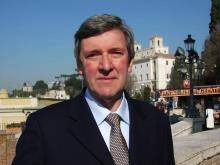During Pope Francis’ recent visit to the Philippines, I had the joy of meeting once again a man I have known for over a decade and greatly respect: Cardinal Gaudencio Rosales, the emeritus archbishop of Manila. We talked about many things, but two in particular stood out: the vocation of the Filipino people in Asia today, and the future of the church in China.
The tall, distinguished looking 82-year-old cardinal attributed great significance to the fact that three popes had visited his homeland over the past half century: Paul VI, John Paul II (twice) and now Francis. “I think it’s about time that we Filipinos realized our position in Asia, what we are as a people, what we are as believers, what we are as disciples of Jesus Christ, what we are as a nation,” he said.
All three popes delivered the same challenging message, he said. “They told us Filipinos: ‘You are a special people, with a special mission in Asia.’ They said, ‘You are a different kind of people in this part of the world, maybe in the whole world but certainly in this part of the world. Your mission is special, as is the extraordinary grace that you have received. You must be touched by God.’”
Cardinal Rosales revealed that when Francis drove into Manila on the night he arrived in the country and saw the enormous crowds lining the route, he whispered to Cardinal Antonio Luis Tagle, “Look at these people, the crowds, the Holy Spirit must be touching them!”
He said Francis knows that the church in the Philippines is providing formation for priests and religious from many Asian countries, including China; and Filipino priests, religious, lay missionaries and immigrants are bringing the good news of Jesus to many lands and giving new life to many local churches worldwide. For these reasons, he said, Francis also emphasized the “special role” of the Philippine church in today’s world.
Cardinal Rosales said he is particularly impressed by Francis and his extraordinary ability to reach the Asian soul through his humility, humanity, empathy and concern for the poor. When I mentioned that like Francis Xavier and Matteo Ricci, Jesuit missionaries who preceded him, the first Jesuit pope has his eyes firmly fixed on Asia because he believes the future of the church lies there, Rosales responded: “He’s right. It’s unfolding before our eyes. It’s being realized now. What the missionaries have done is beginning to unfold before us today.” One sees this not only in the Philippines, he said, but also in Korea, Vietnam and China.
Like so many Filipinos, and four other members of the College of Cardinals, Rosales has Chinese blood in his veins. He hopes and prays daily that relations will improve between China and the Holy See. But, he insisted, achieving this goal requires great sensitivity on the Vatican’s part.
He recalled attending a conference of the Federation of Asian Bishops Conferences in Taiwan in the early 1980s that brought together bishops and missionaries from all over Asia, including mainland China. He had told that “if God is the God who wants people everywhere to know him, and every people to know what goodness, kindness, compassion and mercy there is in Jesus Christ, then there must be another chance for mainland China.” He said he is convinced that “God will give another chance to China; he’s a God who gives many chances.”
Asked by participants what he meant by “another chance,” the cardinal explained that “historically there were miscalculations, mistakes [by Rome]. Remember Matteo Ricci? He was on the right track. Just imagine if Rome had allowed Ricci to do what he was doing then, we’d be reading a very different history of the world today. The entire world would have been different, but they bungled the whole thing!”
Rosales told me that at the end of that conference he raised a question that remained unanswered: “If God gives another chance to China, are we ready? Are we ready spiritually? Are we ready psychologically? Are we ready in terms of understanding their history and culture? Or are we still tied to our former interpretations of their history and so on?” He believes these questions are still relevant.
And when I put it to him that Francis appears to be on the verge of a breakthrough with China, Rosales said: “Pray for that! I pray for that. And maybe, being a Jesuit, God will give him a special light, special guidance, accompaniment and inspiration to accomplish this mission.”








